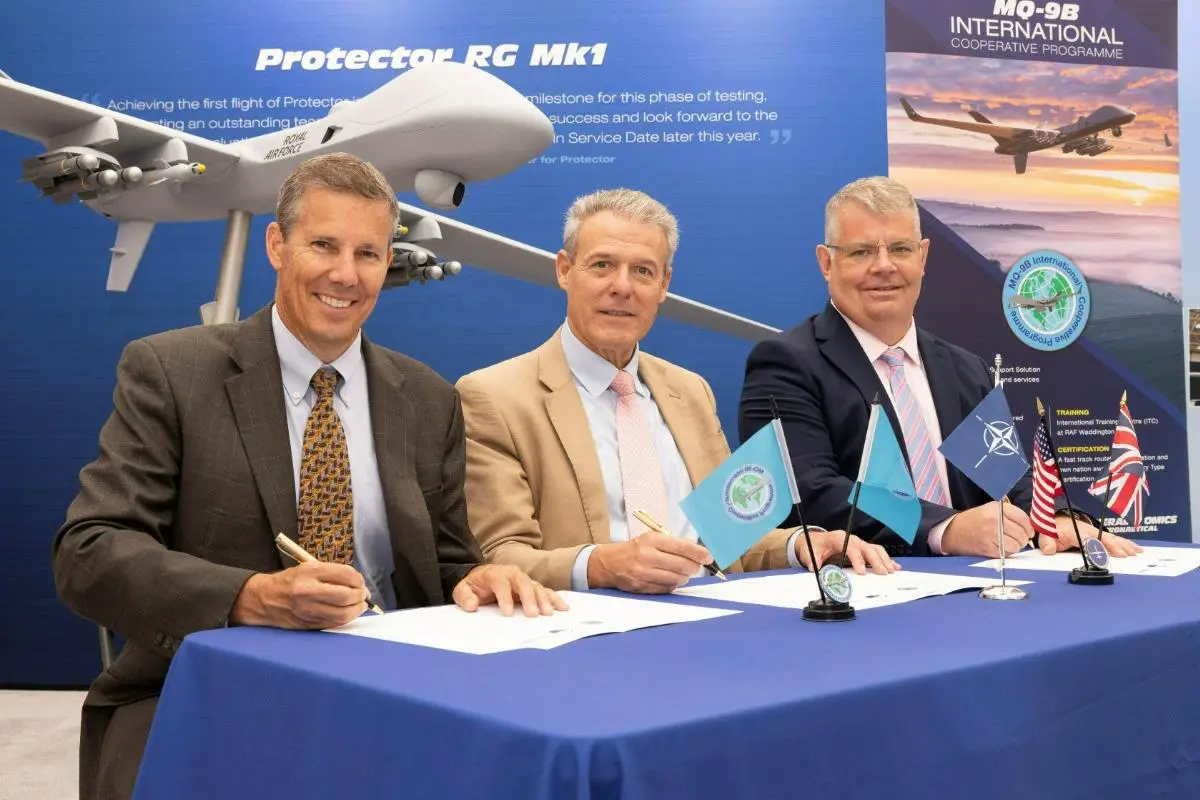The NATO Support and Procurement Agency (NSPA) participated in the signature ceremony marking the start of the new MQ-9 International Cooperation (MIC) Support Partnership (SP) with the United Kingdom and Belgium as the founding Partnership Member Nations and General Atomics – Aeronautical Systems, Inc. (GA-ASI) – the manufacturer of the MQ-9A and MQ-9B remotely piloted aircraft. Other NATO and non-NATO nations will be invited to join the MIC SP as Members, Observers or Associate States. The MIC, the 38th SP of NSPA-led Support Partnerships will build on the work done by the UK-led MQ-9B International Cooperative Programme (MICP) over the last four years, which currently comprises ten nations as Participants and Observers, along with the United States Air Force (USAF), GA-ASI and NSPA as Enablers. NSPA and the MIC SP will provide a proven and turnkey legal framework for: furthering cooperation amongst the Member Nations; enhancing interoperability; facilitating training and fostering collaboration.
This framework will enable the consolidation of national requirements for future capability enhancements and sustainment solutions and multinational contracting with GA-ASI or the US Government to achieve significant benefits such as interoperability and commonality, economies of scale and cost-sharing. The two founding Participants of the MICP have now become founding Partnership Member Nations in the MIC SP. Current Observers in the MICP will have the ability to transition to Members, Observers or Associate States in the MIC SP. The MICP name will be used by GA-ASI to describe the totality of the global MQ-9B community of users, which includes some states that may not seek to or cannot become MIC SP members. Those NATO and non-NATO Nations that join the MIC SP will work together to develop a roadmap for future MQ-9B capability enhancements and a common set of requirements for sustainment to allow contracting with GA-ASI to be simplified and cost reductions to be achieved.

“The establishment of the MIC SP by the UK and Belgium represents a significant step forward in delivering the benefits that can be obtained from working together internationally under the NSPA. With support from General Atomics – Aeronautical Systems and engagement from the many other NATO and non-NATO nations that are embarking on a path to introduce MQ-9B, there is a bright future ahead for this truly international programme,” said Wing Commander Richard Long, MQ-9B (Protector) lead.
The MIC SP represents NSPA’s added value solution in support of NATO and National Autonomous Systems requirements by consolidating the acquisition and sustainment services for all the member nations. This offers the benefits of economies of scale, aggregated demand signals to industry, and increased commonality for operations and sustainment. Further, the collaboration with General Atomics – Aeronautical Systems will foster this international cooperation among all the involved stakeholders, which in turn will benefit the entire programme,” said Allan McLeod, NSPA Director of Life Cycle Management.
Member Nations will decide on the priorities of the MIC SP and drive them forward across the community and with GA-ASI. The relationship between the MIC SP and GA-ASI’s global user community formed under the MICP banner, of which all of the MIC SP Member Nations will also be part, is being developed such that there is a clear synergy between the two groups to allow the objectives of the MIC SP to be met along with the needs of GA-ASI to support its global user community. The MIC SP will operate under the legal framework of the NATO Support and Procurement Organisation (NSPO) and the stewardship and governance of the NSPA as a NATO agency and draw on the rules and policies that have been agreed by all 32 NATO Nations. Member Nations will decide on the priorities of the MIC SP and drive them forward across the community and with GA-ASI. The relationship between the MIC SP and GA-ASI’s global user community formed under the MICP, of which all of the MIC SP Member Nations will also be part, is being developed such that there is a clear synergy between the two groups to allow the objectives of the MIC SP to be met along with the needs of GA-ASI to support its global user community. There will also be the opportunity for Member Nations to draw on the expertise of the UK from its military type certification of MQ-9B and to take advantage of the aircrew and groundcrew training provided by the UK through the NATO Flight Training Europe (NFTE) RPAS facility at RAF Waddington, in Lincoln. These initiatives will help Member Nations foster the development of common tactics, techniques and procedures and strengthen the ability to deliver exceptional support and services to the MQ-9B community.















